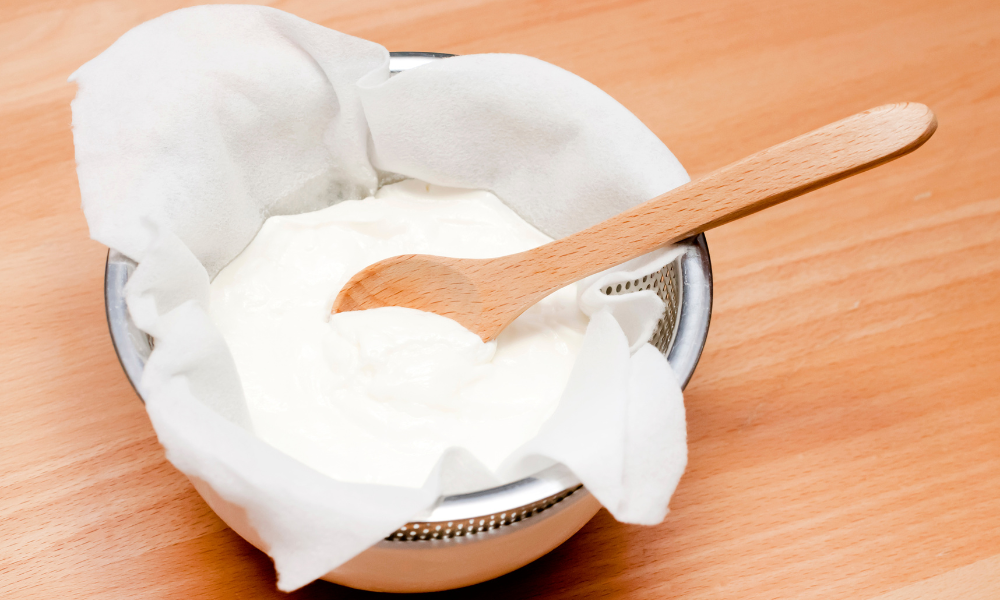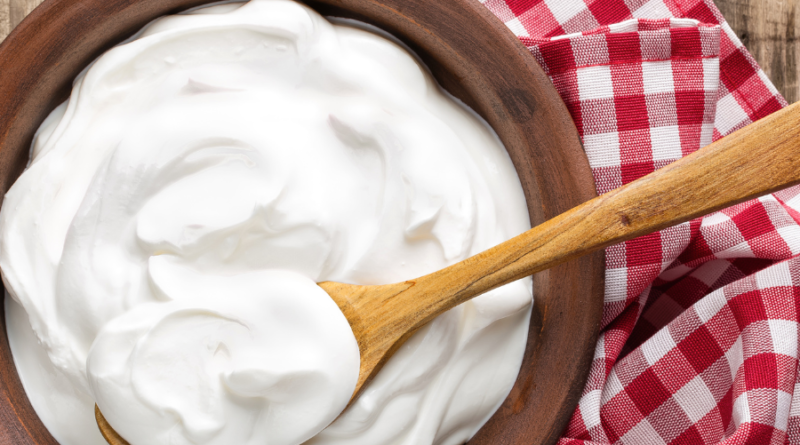Can you freeze yogurt? YES – here’s how!
Does Yogurt go bad after freezing?
Believe it or not, many people need help deciding if they can freeze Yogurt. Sure, you can do a bunch of research to figure out the answer– but who has time for that? The good news is the answer is Yes; you can freeze Yogurt. Freezing can make Yogurt last longer and keep its flavour intact since freezing does nothing to lower the quality of its content.
Go ahead and take that lactose-filled delight and stick it in your freezer. And if you’re wondering what will happen to Yogurt after being frozen for a while. There’s no need to worry, as thawed Yogurt tastes perfectly fine and can be used immediately. So don’t let the fear of food going bad stop you from taking advantage of all that freezing offers.
How can I freeze Yogurt?
Freezing Yogurt is a great way to save money and reduce food waste. To freeze it properly:
- Take a single-serve container of your favorite Yogurt and spoon it into an airtight container before storing it in the freezer.
- Leave some space so the Yogurt has room to expand as it freezes.
- For best results, try to use your frozen Yogurt within a month or two of freezing it – and enjoy.
Is Yogurt bad?
Suppose you thought Yogurt was bad for you due to its high level of sugar or artificial flavors. However, there are multiple benefits to eating it regularly. Yogurt contains essential proteins, vitamins, and probiotic strains of bacteria, which help keep your digestive system balanced. Studies have even shown that eating Yogurt might decrease the risk of certain cancers, heart disease, and obesity – all great reasons to include it in a balanced diet. There are countless varieties of yogurts available, both with added sugar or natural sweeteners and plain versions, making it easy to find something that suits your tastes while still reaping the many health benefits of this beneficial food.
How long does Yogurt last in the freezer?
Freezing Yogurt is a great way to extend its shelf life and ensure an optimal taste time. Unopened packs of Yogurt have a shelf life of up to seven days in the fridge. But when frozen, you can store it for several months without compromising quality or flavor. Yogurt that has been opened should be kept in the refrigerator for up to one week. But if placed in the freezer at -40°F, it can last around six months. Buyers also need to ensure they freeze their Yogurt within two hours of being taken out from the store refrigerator. And keep it out at room temperature for no more than two hours after being defrosted before consuming.
Can you freeze Greek Yogurt?
Can you freeze Greek Yogurt? You might be surprised that, yes, you can. Freezing Greek Yogurt helps to prolong its shelf life and can provide some interesting texture changes depending on your variety of Yogurt. When frozen, Greek Yogurt takes on a delicious creamy texture, not unlike ice cream in consistency.
It’s a great way to use any excess tubs before expiring. It can easily be added to breakfast smoothies or made into yogurt-based ice cream. Be sure to leave room for expansion in the container and defrost the Yogurt overnight in your refrigerator for optimal results. With this simple process, you can make sure your Greek yogurt never goes to waste.
How to Thaw Frozen Yogurt?
Can you freeze Yogurt? Thawing frozen yogurt can be a tricky endeavor. But with these helpful tips, it doesn’t have to be. The first step is to ensure the Yogurt you purchase for freezing has been stored at the proper temperature. Can you freeze Yogurt? Absolutely! If done correctly, this process will preserve the flavor and texture of the Yogurt. The next step is to thaw the frozen Yogurt out properly.

Microwaving your frozen Yogurt should typically take at most 40-60 seconds. Alternatively, leaving it on your countertop and allowing it time to reach room temperature is recommended. Whichever method you choose, it’s important only to thaw for a short time as that can alter the taste and texture of your desired snack. Withbringingsimple steps bringing your frozen Yogurt back to life will be a quick and delicious process.
Tell me the best way to use frozen Yogurt.
Can you freeze Yogurt? Frozen Yogurt is a delicious and healthy way to satisfy a sweet tooth without compromising the quality of your diet. The best way to use frozen Yogurt is by combining it with fresh fruits, such as peaches, blueberries, strawberries, or bananas.
It creates a delicious combination and adds flavor and beneficial vitamins and minerals like Vitamin C to boost your diet. You can also top off your frozen Yogurt with nuts for some added crunch or dark chocolate chips for guilt-free indulgence. There is no wrong way to enjoy frozen Yogurt.
Baked goods
The best way to use frozen Yogurt is to utilize it in various delicious, homemade baked goods. With its creamy consistency and subtle sweetness, frozen Yogurt makes for the perfect topping on a wide array of treats. Baked donuts filled with frozen Yogurt are decadent and make for a unique spin on the classic treat.
Apple pies filled with frozen Yogurt instead of ice cream provide a welcome change to an old favorite. Cookies also have an additional richness when mixed with frozen Yogurt. Try experimenting next time you head to the kitchen with this versatile ingredient – your taste buds will thank you.

Savory dishes
One of the best uses for frozen Yogurt is in savory dishes. You can incorporate a scoop of this tangy treat into your favorite entrees or side dishes for an unexpected twist. Many recipes suggest using plain Yogurt to replace sour cream in tacos or burritos, resulting in a creamy yet lighter alternative.
You can also mix some yogurt, fresh herbs, and spices for a curried dip to serve with grilled skewers or fish. There’s no limit to the unique recipes you can create with frozen Yogurt — why not add some sweetness to your next dinner party?
Sauces, dips, and spreads
Frozen Yogurt can be a tasty and healthy treat that is equally as satisfying as ice cream. The best way to enjoy frozen Yogurt is to top it off with your favorite sauces, dips and spreads. Freshly sliced strawberries or pineapple are great additions since the natural sweetness complements the tartness of the Yogurt.
Moreover, if you want a quick flavor fix, stirring in some honey or maple syrup does the trick. For added depth and texture, you can also incorporate other ingredients, such as dark chocolate chips or candy sprinkles.
Alternatively, you can serve frozen Yogurt alongside warm treats like skillet cookies for an indulgent snack or dessert. With so many delicious combinations, let your tastebuds explore the frozen yogurt world.
How does Yogurt taste after freezing?
Can you freeze Yogurt? Absolutely! Freezing changes the texture. But it can be surprisingly tasty and enjoyable. Yogurt that has been frozen takes on a creamy, icy slush consistency that is incredibly satisfying on a hot summer day. Cooled to just the right temperature, frozen Yogurt can be as refreshing as an ice cream bar without the guilt that often comes with eating unhealthy sweets. Anyone with an open mind should give this unique twist on Yogurt a try.
Texture
Freezing Yogurt offers a truly unique experience – one that is both creamy and crunchy. Many have described the texture as like sorbet, with a smooth feel punctuated by the occasional burst of icy solids. It no longer has its trademark tangy flavor.
It has taken on wispier hints of sweetness while supporting all the flavors you’d hope to find in Yogurt. The trick is to leave it in the freezer for a short time, as more time will make it harden beyond recognition.
Taste
Eating frozen Yogurt can be an interesting and unique experience. Depending on how it has been made, the taste of frozen Yogurt can vary widely – from creamy and soft to icy and crunchy. Taste-wise, many say frozen Yogurt is like a delicious mix between ice cream and regular Yogurt.
It’s a delightful mix of coldness, sweetness, tanginess, and unique flavors, for those that haven’t tried its unique flavor yet. You may find yourself hooked after your first spoonful.
What happens when you freeze it?
Can you freeze Yogurt? Freezing any object instantly decreases its temperature, as well as its ability to react with other substances. For example, freezing Yogurt can have a thicker and creamier texture when it is thawed out.
Can you freeze Yogurt? Absolutely! Though the same reaction will occur with any dairy-based product like Yogurt. When frozen, it may become more solid and tougher to spread due to the upheaval of fabrics.
Freezing the Yogurt produces ice crystals which eventually accumulate on the fat molecules of the dairy. Thus creating a firmer texture once thawed out. Thus, caution must be taken when handling frozen Yogurt. Otherwise, it can easily be damaged during freezing and refrozen again.
Freeze yogurt in a container
Freezing yogurt can be a great way to extend its shelf life. Freeze Yogurt in a container, ensuring that it is tightly contained to avoid freezer burn. Once the Yogurt has frozen, you may find it to have an icy texture and solidified shape, making it ideal for use in recipes that call for frozen Yogurt.
Experiment with flavorings like spices or fruits before freezing for an interesting twist to make your recipe stand out. Additionally, spooning small portions of frozen Yogurt into an ice cube tray allows you to portion individual servings.
Freeze yogurt in a cube tray
Freeze Yogurt in a cube tray, and you can easily enjoy frozen yogurt treats that are both sweet and healthy. Freezing yogurt also means you can extend its shelf life since it won’t spoil as quickly. Freeze-dried Yogurt is a nutritional powerhouse packed with protein, calcium, and probiotics. Which helps balance the digestive system by introducing “good” bacteria. It can last for weeks or even months when stored correctly and offers an easy way to make snacks for kids of all ages. Freeze-dried treats are also great for art projects or as a fun addition to smoothies or other meals.
In lukewarm water
Freezing a material is a process that can cause rapid and significant change. In lukewarm water, the molecules will move around freely, allowing them to stay liquid. However, those same molecules become rigid when frozen and lock into position with their neighbours.
It causes ice crystals to form and the water to become solid. The quickness of this transition varies; depending on the type of material and the temperature at which it is frozen. Some materials may freeze almost instantly, while others could take hours or even days to fully cold-harden. In any event, it is an amazing transformation that alters both material structure and function in ways impossible while remaining in a liquid state.
On the stovetop
Freezing a liquid is an interesting transformation to observe, and the consequences it can have on food. On the stovetop, freezing something involves two simple processes; cooling the substance below its freezing point. And allowing its molecules to arrange in a predetermined form. Upon freezing, some liquids will become denser and more rigid; think of how water expands when frozen, for example.
On the other hand, some already rigid liquids will become harder. More brittle due to further molecular squeezing by the cold. Whether liquids change their texture or not, freezing generally affects their chemical structure, resulting in different tastes after thawing. It is important to consider and observe what happens when you freeze something.
In the fridge
When something is put in the fridge, it experiences a drastic change in temperature from room temperature to around 0.5 Celsius. In this cooler climate, organisms that rely on liquid water for their machinery can’t work properly, slowing down metabolic processes and temporarily halting food chemical reactions.
This means things like ice cream are becoming solid, sauces are thickening up, and any bacteria present cannot multiply as easily as they would at room temperature.
In general chemistry terms, decreasing kinetic energy means some substances will be solidifying or sublimating when exposed to cold temperatures.
Can you freeze Yogurt? Yogurt health benefits
Can you freeze Yogurt? Yogurt is a popular and nutritious snack that provides many health benefits. It is a rich source of protein and various vitamins, minerals, and probiotics.
Studies have found that Yogurt can boost the immune system and support digestive health. Regular consumption may also reduce blood sugar levels and lower the risk of heart disease and colon cancer. In addition, Yogurt helps improve bone density, keeping bones strong and healthy.
For best results, look for varieties that are low in sugar, fat-free or low-fat, and contain beneficial ingredients such as fiber and probiotics. Enjoying Yogurt as part of a balanced diet is an excellent way to receive all its health benefits while adding variety to meals.
Yogurt Nutrition Facts
| Calories | 149 |
|---|---|
| Fat | 8g |
| Sodium | 113mg |
| Carbohydrates | 11.4g |
| Fiber | 0g |
| Sugars | 11.4g |
| Protein | 8.5g |
| Phosphorus | 233mg |
FAQ’s
What happens if you put Yogurt in the freezer?
Putting Yogurt in the freezer is a great way to extend its shelf life and maintain its delicious, tangy taste. It can also create new culinary dishes, which have transformative properties when frozen.
When you put Yogurt in the refrigerator, the bacteria present will slow down their metabolic activities and remain dormant until they reach a warmer temperature. This results in an extended shelf life of up to two weeks – double that of regular Yogurt stored at room temperature. Freezing yogurt further extends this lifespan; it will last several months without much loss of texture or flavor.
In terms of texture, the freezing process changes how your Yogurt feels once thawed. Natural culturing processes transform it into a thicker consistency, more like cream cheese than traditional pudding-like Yogurt. This can be ideal for savory recipes like dips or adding body and substance to smoothies.
Because it’s not quite wet after freezing (as water molecules are naturally released during thawing), you can also use it when baking cakes and other desserts where liquid ingredients would otherwise make them soggy.
If you decide to freeze your Yogurt, place only one cupful into individual containers completely sealed against air exposure before freezing. This helps protect against the possibility of ice crystals forming on its surface over time, which could reduce flavor quality slightly if left too long in storage.
Be sure to thoroughly thaw any frozen portions by allowing them time at ambient temperatures overnight. Or defrost them slowly under running hot water before consumption. Depending on what type of recipe you plan on making with your newly transformed product! Enjoy.
What happens if you freeze Greek Yogurt?
Freezing Greek Yogurt is certainly possible; however, it can have a detrimental effect on the product’s texture and flavor. It’s important that when frozen, Greek Yogurt will become thicker and denser. Inconsistency as well as more acidic in taste. This is because cold temperatures cause milk proteins to clump together, resulting in an overall texture and flavor change.
Suppose you do decide to freeze your Greek Yogurt for later use. There are several things you should keep in mind.
Make sure your container can handle frozen; glass jars tend to crack over time due to expansion from low temperatures or sudden temperature changes. If you use plastic containers for storage, select ones with airtight lids. So as not to let any cold air enter the packaging before it reaches its destination—your freezer.
Additionally, avoid mixing other ingredients, such as honey or nuts, into your Greek Yogurt before freezing since these ingredients might interfere with the freezing process and degrade quality further.
Lastly, always thaw your frozen Greek Yogurt at room temperature. Before serving/consumption—this will allow it time to regain its textures. While also rebalancing its acidity levels once again. Then enjoy.




